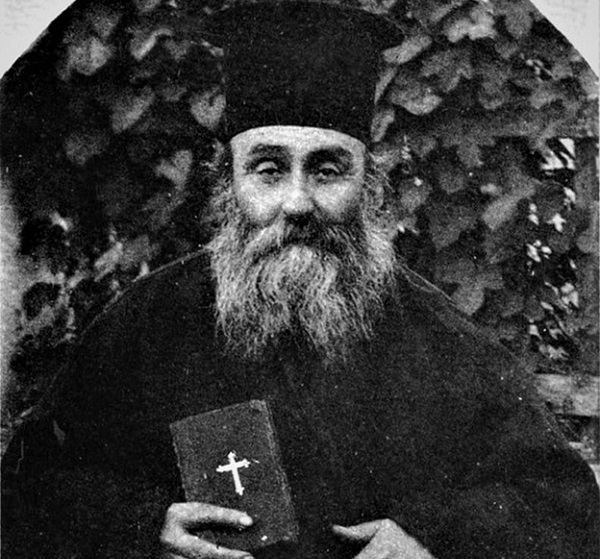Saint Nikolaos Planas: the blessed priest
3 March 2023On March 2, the Church celebrates the memory of a modern saint, Saint Nikolaos Planas. He was a rare clerical figure who shone brightly in Attica in the last century and is the boast and model of the devout Orthodox clergymen who came after him.
He was born on Naxos 1851. His parents were the devout and comfortably-situated Ioannis and Avgoustina. From an early age, he showed signs of being devoted to the Church, serving as an altar-boy. At the same time, he cultivated rare virtues, such as, for instance, sharing his small portion of bread with other children in the neighborhood who were starving hungry. He received a little education from his grandfather, the priest Georgios Melissourgos, and later improved on this by himself. In 1864, his father died and his mother moved to Athens with little Nikolaos and his sister, settling in the neighborhood of Saint Panteleimon on the Ilisos. At the age of seventeen, under pressure from his mother, he married Eleni Prosvelengiou from Kithira, with whom he had a son, Ioannis. Soon afterwards, his wife fell ill, however, and died.

In 1879, he entered the ranks of the clergy, being ordained deacon in the church of the Transfiguration of the Savior, in Plaka. In 1884, he was ordained to the priesthood in the chapel of Saint Elisha, in Monastiraki, thus fulfilling his childhood dream. As is well-known, the great Greek author, Alexandros Papadiamantis, used to sing in this small but beautiful and solemn church, together with his cousin, Alexandros Moraïtidis. Papa-Nikolas served there on a daily basis for many years, his simplicity and compunction becoming a center of attraction for many Athenians, Thereafter he served at the church of the Transfiguration and, after that, at the chapel of Saint John the Forerunner of the Hunter*, a dependency of the Monastery of Saint Katherine in Sinai. In those days, the area was no more than paddocks and fields. The good priest worked wonderfully well at his pastoral and charitable activities. A whole host of Athenians flocked there to attend the liturgy and receive a blessing. The income of the church increased and this was distributed by Papa-Nikolas to the poor. Poor and distressed people went to him for help and for spiritual and material support.
He himself was as innocent as a young child and never had a bad thought. This is why he often fell victim to accomplished charlatans, who pretended to be poor in order to be given money. He never kept any money for himself, and this was at a time when clergymen had no stipend and lived either off contributions from their parishioners or their own work. He would take with one hand and give to the poor, the widows and the orphans with the other. Every evening he would go to bed penniless and often hungry.
A great many people loved and respected him, considering him a saintly person and a proper clergyman. There were, however, others who hated him, cursed him and stole from him openly. He repaid them with kindness, smiles and blessings. He never swore and never became angry. He had a good word for everybody. He had boundless humility and was often heard to blame himself for being a proud and ungrateful sinner.
Ho observed all the fasts of the year and abstained even from oil. He was simple and affable. He didn’t reprimand anyone, even the greatest sinners, but would counsel them with love and child-like simplicity. Although he was virtually illiterate, he was distinguished by an incomprehensible wisdom, which astonished well-educated people who interacted with him. When he took confession, he would cry like a little child with those who were confessing.
His great joy and delight were the church services, especially the vigils, which he held often. He continued this practice into his old age. He would stand before the holy altar for ten to fifteen hours, wide awake and despite the unbearable pain in his legs. When he served, he lived in another dimension and lost all sense of time. Entirely focused on the prayers and the exact performance of the services, especially the Divine Liturgy, he was completely detached from everything worldly and transient. He felt neither cold not heat, nor any bodily aches and pains. On numerous occasions, little children in the congregation shouted that the priest wasn’t walking on the ground but was up in the air. Other children saw angels concelebrating with Papa-Nikola. At some all-night vigils, he himself had been vouchsafed to hear the angels singing. His sanctity was obvious.
His ceaseless pastoral work and voluntary privations took their toll. On 28 February 1932, he celebrated for the last time and collapsed. He remained bed-ridden until 2 March, when he surrendered his holy soul to God, whom he loved so much and whose Church he served. In 1992, he was declared a saint. His holy relics lie in the church of Saint John in Vouliagmeni Street, where they bless the faithful and perform many miracles.
Saint Nikolaos Planas embodies the true model of an Orthodox priest who is imbued with the tradition of the Hesychasts and Kollyvades within the Church. He’s the prototype of unaffected piety and complete devotion to God, disconnected in any way to the vapid rationalism which sows within us the seeds of soul-destroying doubt and unbelief. May he pray for us all at the throne of grandeur of God.






